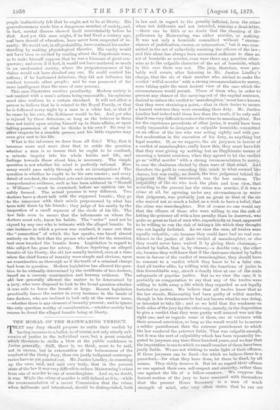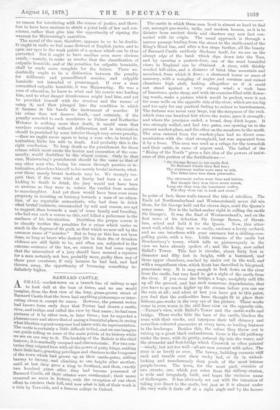THE MORAL OF THE MAINWARING VERDICT.
THAT any Jury should propose to settle their verdict by having recourse to a ballot, is, of course, not only utterly sub- versive of justice in the individual case, but a great scandal, which threatens to strike a blow at the public confidence in Juries generally. Still, there is, we think, more to be said, not in excuse, but in extenuation of the heinousness of the conduct of the Derby Jury, than oar justly indignant contempo- raries have as yet pointed out. Mr. Justice Lindley, in summing up the case, said, and said. very truly, that in the present state of the law it was very difficult to reduce Mainwaring's crime from one of murder to one of manslaughter. And so, no doubt, it was. While the crime of murder is still defined as it is,—while the recommendation of a recent Commission that the crime, when deliberate and intentional, should be distinguiehed, both in law and. in regard to the penalty inflicted, from the .crime when not deliberate and not intended, remains a dead-letter, —there can be little or no doubt that the shooting of the policeman by Mainwaring was either murder, or nothing. It was not only a homicide committed without " circum- stances of justification, excuse, or extenuation," but it was cern. milted in the act of unlawfully resisting the officers of the law ; and this alone has always been accounted sufficient to class an act of homicide as murder, even were there any question other- wise as to the culpable character of the act of homicide, which in this case there was not. The jury, therefore, were pro- bably well aware, after listening to Mr. Justice Linsidey's -charge, that the six of their number who wished to make the verdict 'wilful murder' with a strong recommendation to mercy, were taking quite the most lenient view of the case which the circumstances would permit. Those of them who, in order to prevent any chance of the carryiug-out of the capital sentence, desired to reduce the verdict to ' manslaughter,' must have known that they were straining a point, —that in their desire to secure a lenient sentence they wore exceeding their duty. Mr. Justice Lindley had indeed told them less than the truth, if he only said that it was very difficult to reduce the crime to manslaughter. But for the capricious precedents of other juries, it would have been really impossible to designate a culpable homicide, committed on an officer of the law who was acting rightly and with per- fect moderation in the execution of his duty, as anything but legal murder. If, as we suppose, the six jurymen in favour of a verdict of manslaughter, really knew this, they must have felt that they were giving up nothing but an illegitimate means of ensuring a lenient sentence, when they agreed to let the verdict go as wilful murder' with a strong recommendation to mercy, in case the chairman elected by them were of that mind. And therefore the guilt in conceding this much to what seemed like chance, but wan really, no doubt, the true judgment 'behind the judgment they had announced, was the less sells:ma. The culpability of the six who took the plain and true view, that according to the present law the crime was murder, if it was a crime at all, for agreeing under any circumstances to waive that judgment, was probably just as great as that of the six who waived not so much a belief, as a wish to have a belief, that the crime was manslaughter. But of course no one would say that the offence of these who were willing to run the risk of letting the prisoner off with a less penalty than he deserved, was quite as great as that of men who, superficially at least, appeared to be willing to run the risk of taking a life which they thought was not legally forfeited. As we view the case, all twelve were equally culpable,—six because they could have had no real con- fidence in the justice of their verdict of manslaughter, or else they would never have waived it by giving their chairman,— elected by ballot, that is, by chance,—a double vote ; the other six, because they well knew that if the chairman elected by ballot were in favour of the verdict of manslaughter, they should have to consent to a verdict which they knew to be a false one. And all twelve alike, by trifling with the functions of juries in this discreditable way, struck a deadly blow at one of the main safeguards of popular justice. But as we view the case, it is probably an exaggeration to say that any of the twelve were willing to trifle away a life which they regarded as not legally forfeited to justice. We believe that all twelve knew that as the law stands, Mainwaring had been guilty of wilful murder, though in his drunkenness he had not known what he was doing, or intended to take life ; and so we hold that the weakness on both sides of the jury lay the other way, namely, in the disposition to give a verdict that they were pretty well assured was not the right one, and as regards some of them, one at variance with their avowed conviction, so long as the result would be to secure a milder punishment than the extreme punishment to which the law rendered the prisoner liable. That was culpable enough, but it was the sort of culpability which has been repeatedly im- puted to jurymen any time these hundred years, and we fear that • the imputation is one to which no small number of them have been justly liable. We are not wishing to make light of their offence. If these jurymen can be fined—for which we believe there is a precedent, —for what they have done, lot them be fined, by all means. They richly deserve it. But let us regard their offence as one against their own self-respect and. sincerity, rather than one against the life of a fellow-creature. We suppose the lenient section of the jury to have reasoned with themselves that the present Home Secretary is a man of much strength of mind, who very often states that he can .see
no reason for interfering with the course of justice, and there- fore to have been anxious to strain a point both of law and con- science, rather than give him the opportunity of signing the warrant for Mainwaring's execution.
The moral of the case, therefore, appears to us to be double. It ought to make us feel some distrust of English juries, and to open our eyes to the weak points of a system which can be thus perverted. Bat it ought to have another even more obvious result,—namely, to make us resolve that the classification of culpable homicide, and of the penalties for culpable homicide, shall be made more complete for the future. There un- doubtedly ought to be a distinction between the penalty for deliberate and premeditated murder, and culpable homicide not intended or prearranged. If ever a man committed culpable homicide, it was Mainwaring. He was a man of education, he knew to what end his course was leading him, and to what danger drunkenness might lead him, and yet he provided, himself with the revolver and the means of using it, and then plunged into the condition in which it became in his hands the instrument of murder. If his crime does not deserve death,—and certainly, if the penalty awarded to such murderers as Palmer and Katharine Webster is nothing more than death, it would seem that murders committed without deliberation and in intoxication should be punished by some inferior though very severe penalty, —then we ought never again to hang a man who, in brutal in- toxication, kicks his wife to death. And probably this is the right conclusion. To keep death as the punishment for those crimes which most excite the horror and execration of the com- munity, would doubtless be the wisest course. Only- in that case, Mainwaring's punishment should be the same as that of any other man who, losing his reason through passion or in- toxication, abandons himself to his merely brutal instincts, what- ever those merely brutal instincts may be. We strongly sus- pect that, if the ease tried at Derby had been a case of kicking to death in drink, the jury would not have been so anxious as they were to reduce the verdict from murder to manslaughter. And yet there would have been even more propriety in insisting on leniency towards a man of no educa- tion, of no reputable antecedents, who had done in drink • what brutal instincts, uncontrolled by will and reason, are apt to suggest, than towards a mati of some family and breeding, who had run such a course as this, and killed a policeman in the madness of his intoxication. Doubtless the proper course is to classify further the penalties for a crime which varies so much in the degrees of its guilt, as that which we now call by the common name of "murder." But so long as this has not been done, so long as boors who destroy life in their fits of drtinken violence are still liable to be, and often are, subjected to the extreme sentence of the law, we cannot but feel some regret that the misconduct of a jury should have secured a reprieve for a man certainly-not less, probably more, guilty than any of those poor creatures, if only because he had had, and had thrown away, the opportunity of becoming something in- definitely higher.



































 Previous page
Previous page